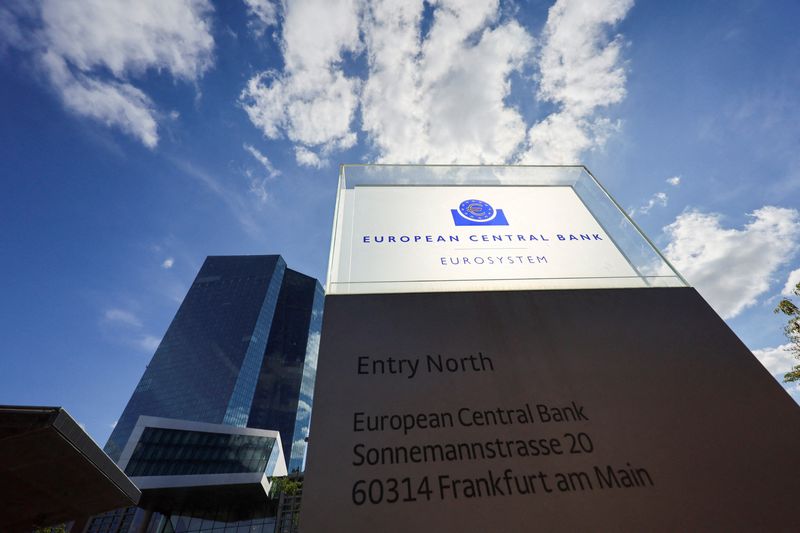By Balazs Koranyi
MARRAKECH (Reuters) - European Central Bank policymakers are planning a springtime push to cut interest payments made to commercial banks, in part to recoup some of the costs associated with a decade worth of stimulus, sources familiar with discussions said.
With banks now earning generous profits, in great part at the expense of the central bank and the taxpayer, policymakers have already cut to zero the rate they pay to lenders on a certain pool of their excess deposits kept at the ECB.
Some policymakers have also been pushing for an increase in that asset pool, known as the minimum reserve ratio and roughly equivalent to 1% of deposits.
That would mean overall interest payments to lenders - which still earn the ECB deposit rate, currently 4%, on other excess cash parked with the central bank - would be reduced further. But the ECB rejected the proposal in July, partly on resistance from its Executive Board, the sources said.
Still, the battle is not over and proponents are looking to make a fresh push to raise the ratio next spring, when the ECB reviews its operational framework, conversations with eight sources indicate.
"This issue must come back, by the framework review, at the latest," one of the sources said. "The reserve requirement is artificially low."
EXCESS LIQUIDITY
At the core of the issue is the 3.6 trillion euros worth of excess liquidity sloshing around in the banking system, much of it created by the ECB when inflation was too low and policymakers were trying to stimulate the economy through a cash injection.
Interest rates are now at a record high, so the ECB's interest expense has soared on this large pool of debt and several national central banks, including the Bundesbank, are generating a loss.
Bundesbank chief Joachim Nagel, his Austrian counterpart Robert Holzmann and Latvia's Martin Kazaks have all made the case for a new discussion on jacking up minimum reserve requirements, a sentiment shared by at least another half a dozen on the 26-member Governing Council.
But the sources say the ECB's board - including Isabel Schnabel, who is in charge of market operations - has not softened its opposition to the change, so any proposal faces an uphill battle.
An ECB spokesperson declined to comment.
Austria's Holzmann made the case this week for jacking the minimum reserves up tenfold to 10% but most sources dismissed this as too large and mentioned numbers in the 2% to 5% range.
They note that Croatia's rate was 9% before it joined the euro on Jan 1 and its banking system functioned well.
PROS AND CONS
A key question is whether the change serves a policy purpose or is simply viewed as a punitive device.
Its supporters say that if cutting the rate to zero this year had a policy purpose, then so does increasing the multiplier, since the outcome is similar.
There are also historical precedents, and the overall impact would be to restrict banks' ability to lend, and this would help dampen inflation.
They also say that since banks benefited from the ECB's copious asset buys in the past, it is only fair they pay for some of the cost now, especially because their large profits are now being paid out to shareholders, a morally debatable outcome.
As a public institution, the ECB's job is to conduct policy at the lowest cost, so reducing losses is not inconsistent with that mandate, they argue.
Opponents -- who also include France's Francois Villeroy de Galhau and Belgium's Pierre Wunsch -- meanwhile say that the main policy instrument is the interest rate and the bank is already using too many tools, so one more would overcomplicate policy.
The board's key argument is that excess liquidity is distributed unevenly across the euro zone and raising the ratio would put an excessive burden on smaller banks with a larger portion of deposits.
"The gain is miniscule and I'm yet to be convinced there is a monetary policy justification," another source said. "We're not in the business of making social policy, so punishing banks is not a legitimate objective."
In an interview last week, Schnabel said the ECB should be cautious about making such changes before it decides on how much excess liquidity it wants to maintain over the longer term.
Higher charges could also force banks to move liquidity outside the euro zone, while a small increase in ratio would cut central bank losses only by tiny amounts, so the ECB would engage in a risky policy with a modest benefit.

"Any sensible tweak - a 1% increase to 2% - in the minimum reserve requirement would have a second-order impact on the level of excess liquidity and would only save the Eurosystem (around) 6 billion euros on yearly interest payments at the current deposit rate," Barclays said in a note.
Deutsche Bank CEO Christian Sewing argued that the change would add to banks' financial burdens and restrict their lending options.